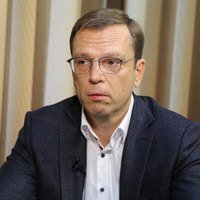Economics of mass hypnosis
Kashpirovsky, Dzhuna, business coaches, Vladimir Solovyov and other prejudice or patriotism speculators
Anatoly Kashpirovsky, a psychotherapist, hypnotist, star of Soviet-Russian television has recently celebrated his 80-year anniversary. Known for his television shows of mass hypnosis on Central television, he opened the banknote-strewn road to show business to a whole range of gurus of varying degrees of fame, dexterity of tricks and financial success. Realnoe Vremya discussed with well-known economists Andrey Movchan and Nikita Krichevsky the issues of the monetization of hypnosis and extrasensory perception to try to find out whether the difference between spiritual and mental practices from the stars of showbiz and popular political talk shows on contemporary Russian television is big.
“One can play on prejudices and make money on it”
Why has the interest in psychics not faded for at least 30 years?
Nikita Krichevsky: It's not about Kashpirovsky or Chumak or any other psychics who charged water or did anything else. The point is in the continuing paganism in the Russian mentality. We were pagans and we are still pagans. Instead of pagan simulacra, there came Christian one. The Church, as it immediately became a state institution, changed one simulacrum to another. Paganism is still with us. As an example, one can cite icons and charms in cars. This is pure paganism, only in the Christian way. Horseshoes, popular signs like a black cat — it all came from there. Everything is in our mentality, but people do not realize it and take it for granted.
For thousands of years, these pagan remnants have been driven underground, what is more — unsuccessfully. You can look, for example, at the worship stones, at the holy springs — they continue to remain where they were. In modern media conditions, this made it possible, on the one hand, to play on people's fears and prejudices that have pagan roots, on the other hand — to make money on it.
There is absolutely nothing surprising in that Mr Kashpirovsky was the first to promote this theme on an industrial scale. Although psychic abilities were attributed to many. Before Kashpirovsky from the recent Soviet past, it had been Dzhuna. She was extremely popular and quite wealthy in the Soviet Union and after its disintegration. She was turned to by the leaders of the party and the government, outstanding artists. She was gifted so generously that she did not think about money. Exactly the same story was with Kashpirovsky.

Imagine, you are offered to spend 50 rubles at the current rate or 50 kopecks of those times to buy something, go to a performance or spend time to charge the water, so that with a probability of one to a million your life would last for 10 years. Even if there is a probability of one million, a person is ready to charge a jar of water because it is economically meaningful. Why do people spit three times or bypass a black cat? Or even pray in the end when flying on a plane? Because the cost of the prayer is minimal, and even if it helps with a probability of one part per million it is sensible. Actually, all such things are based on this. That's what religions are based on. Exactly on this economic concept — you give a little with probability to receive very much.
“In order to live longer with a low probability, you are ready to pay a lot of money”
How does the monetization of extrasensory perception, mass hypnosis happen? What is economics built?
Krichevsky: It's not the economics, it's entrepreneurship. It comprises of performances similar to circus where they sell tickets and “voluntary” donations — give what you can afford, give what you can. Someone gives 100 rubles, someone gives 100,000 rubles — depends on the well-being of a person who turns to a psychic.
Does a person have such abilities? I can definitely say — yes, he or she does. For at least three times I got under the negative influence — I felt it myself, and I was told about it by other psychics. Does this mean that we should live by it and be guided by it? No way.
It is impossible to consider this problem only from the economic point of view because the economy is 50% psychology. If the same Kashpirovsky did not intuitively find the ground, there would not be those millions on whom he earned 30 years ago. I'm not even sure he realized he was on the right track, the pagan essence of the Russian man. He just saw that people are prone to mass psychosis. This, by the way, does not depend on the level of economic development of the country.
If the same Kashpirovsky did not intuitively find the ground, there would not be those millions on whom he earned 30 years ago. I'm not even sure he realized he was on the right track, the pagan essence of the Russian man. He just saw that people are prone to mass psychosis. This, by the way, does not depend on the level of economic development of the country
It is impossible to talk about monetization in relation to this whole area. Because it is a mosaic, and it is necessary to consider each of its elements separately — in the case of Kashpirovsky it is one way of monetization, but sorcerers, witches, psychics — they have the other. The clairvoyants, the same Vanga — they have the third. They are not necessarily expressed in money because money for them is not primary. They're not businessmen by any means. Take any young artist, blogger, businessman. Yes, of course, they need money and revenues, but this is not their end in itself. Self-expression is an end in itself. It's the same with psychics. Someone considers it his duty to help people, someone believes that this is his gift, which was sent down to him from above, and he must use it in order to improve people's lives. At the same time, psychics, paranormal specialists need money just as much as ordinary mortals. But again, they are not intended to make a profit in the first place.
Movchan: they generally earn money by selling tickets for the show. In addition, these people are very often VIP-customers who already pay real money. It can be very wealthy people who have a thousand and hundreds of thousands of dollars. And then they also are ready to pay big money with faint likely live longer or be happy.
Besides, superstitions have the same inductance. For example, you can assume that the probability that charged water helps is one million. But if you have a hundred people around you charging water, in your mind, intuitively, this probability increases dramatically. It becomes equal to one hundredth, not one millionth. And then you are ready to spend on this charged water a thousand times more. When society adopts these rules of the game, there is a false consensus within it that it works.
As I have already said, so the religions work. Religion is always the result of a false consensus. When the apostles manage to create a false consensus of the group, it quickly expands. Joining a group is always easy enough, that is, your feeling that you are doing something useful is much higher than as if you thought about it on your own.
How can you take into account illegal employment or illegal income? You cannot. DO you want to know how much Dzhuna earned? She didn't know that herself. But there are such people in all major cities, to say nothing of small towns
Psychics are shifting to unregulated market
Can you estimate how much money is there in this field?
Movchan: I think it is possible. But I have no concrete data on it. I know that Russia is not the most fertile country in this sense. There are many more such preachers, for example, in the United States, and they are much richer. It is known that among them there are multimillionaires, there are groups and sects where there are tens and hundreds of millions of dollars. It is quite possible that in this economic system the turnover reaches billions of dollars. The Catholic Church, which is the richest example of such a false consensus, has tens of billions of dollars. And according to some reports, even hundreds of billions of dollars.
Russia has less money. Any business grows where there is a solvent clientele. America has it. And it pays. In Russia, the solvent clientele is smaller. It's lower and middle class. Lower, because it is not yet sufficiently educated, intellectually developed. The middle class has enough money to pay for it. It is well developed in, for example, the US, in the West. There is almost no such in Russia — in Russia after wealth there immediately comes poverty, and the rich are not so many. And those people who are satisfied with deep retail, like Kashpirovsky was, — they were, are and will be in Russia.

“They are showmen who speculate on the features of the Russian mentality”
Can business coaches who also conduct mass performances be compared to the same Kashpirovsky who organized the sessions?
Krichevsky: No, they are showmen. Kashpirovsky is also a showman. But he uses the features of the Russian mentality. But these are showmen who speculate on the desire of people to instantly get rich, that is, on greed. There is fear and there is greed. If we follow this path, we can say that in contemporary Russia there are a lot of people who speculate on patriotism. Turn on the TV, there are solid patriots. They speculate on this topic and earn a lot of money. The same Vladimir Solovyov. I see that he doesn't believe in many of the things he says. But this is his income. And patriotism is a feature of the Russian person. What psychological makeup of the nation is the most developed — it is used exploited most of all.
Again, psychics do not earn, do not make a fortune on their abilities. They sell their abilities without giving priority to monetization. They still have another task — self-expression, self-realization. For example, there are shamans from Altai. Oligarch Rybolovlev (Dmitry Rybolovlev — editor’s note), who owned Uralkali, turns to these shamans, pays them a lot of money. But one cannot say that these shamans are incredibly rich.
The same Vladimir Solovyov. I see that he doesn't believe in many of the things he says. But this is his income. And patriotism is a feature of the Russian person. What psychological makeup of the nation is the most developed — it is used exploited most of all
Movchan: It is difficult to give an unambiguous assessment here. We know that there are drugs that objectively help, and there are drugs that are “fake”, but are sold in exactly the same way as the «charged» water is sold. The same applies to business coaches. There are people who can really teach something. There are people who cannot teach anything but they teach, they are promoted and they sell their services for money as Kashpirovsky did. And there are people who can teach something but promise more than they can. Like anywhere in the world.